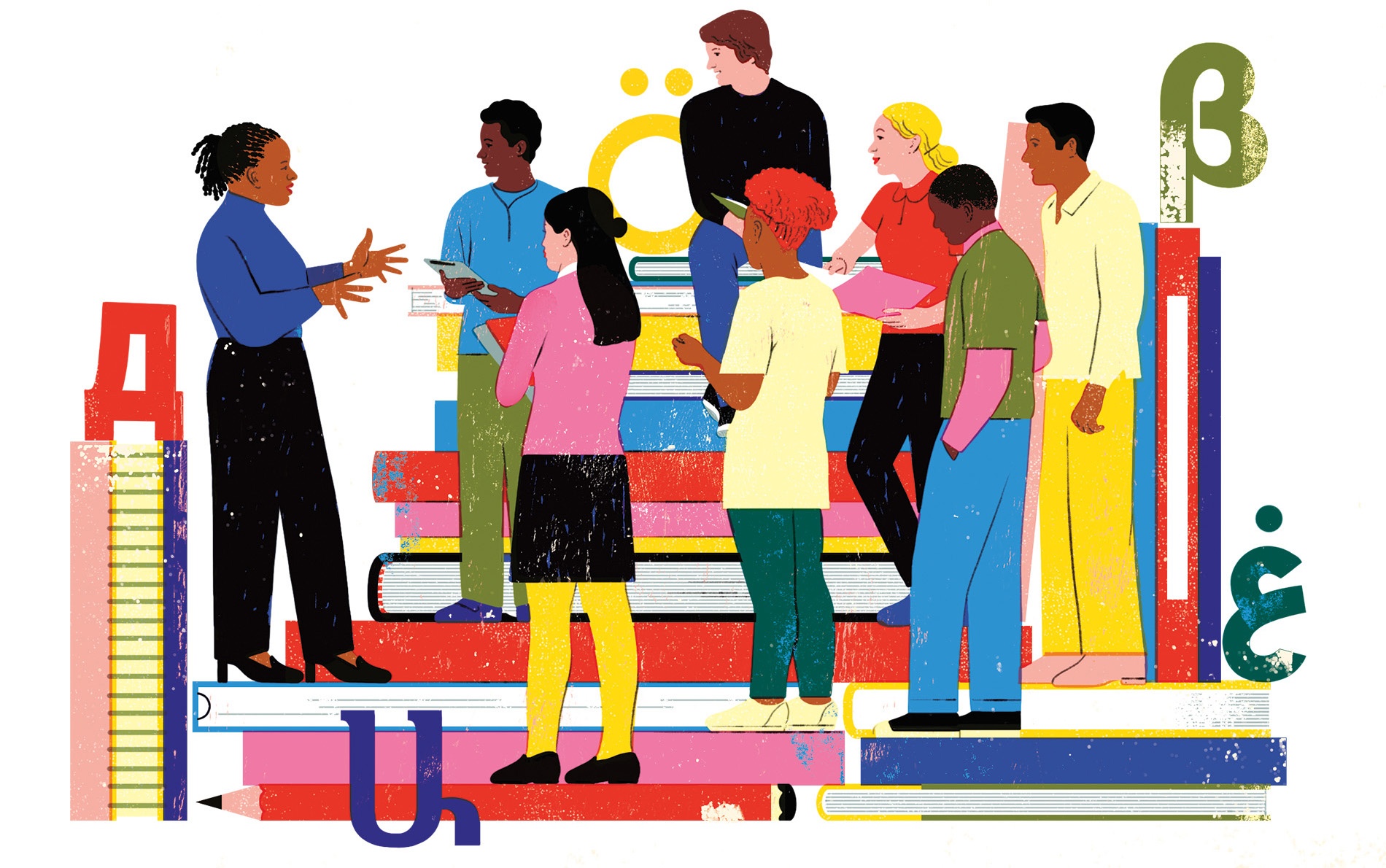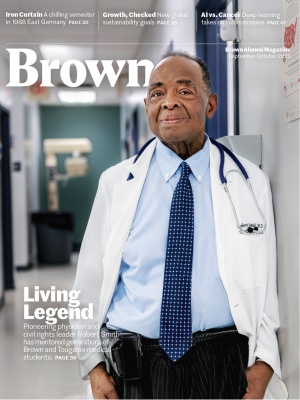
A New Language, in a Hurry
Intensive, double-credit language courses mean fast learning and instant community
For Luka Willett ’24, his Russian love affair started with a bet. In high school his mom dared him to read all of Tolstoy’s Anna Karenina over the summer break. To spite her, he did—and he loved it, launching him into signing up for Russian literature courses at Brown and, this past spring, into trying to master the Russian language.
“I just couldn’t get enough of Tolstoy,” says Willett, who hails from Weston, Massachusetts, and is concentrating in English and International and Public Affairs. When the opportunity came to take an intensive, double-credit Russian language course with acclaimed professor Lynne deBenedette, he and his friend Miguel Rivera Young ’24 jumped on it. “I was like, ‘Yo, there’s this intensive Russian course, let’s do it. I want to learn to read Tolstoy in the original Russian.’”
Willett and Rivera Young had discovered one of the best kept secrets at Brown: the small, double-credit language courses run by most language departments that typically meet for ten hours or more per week, allowing students with minimal or no experience in the target language to go from novice to intermediate level in only one semester. The courses, which usually have fewer than a dozen students, create tight-knit communities of learners who go on to study abroad or travel in their time after Brown.
“What is the challenge is also the reward,” says deBenedette, a senior lecturer in the Slavic Studies department who has been teaching Russian at Brown since 1995. Having taught different forms of intensive language courses for decades, she celebrates the transformational impact that so much time with the target language can have for students.
“The intensive class moves forward with such vigor and speed,” says deBenedette—which means staying on top of coursework, being engaged in class, and keeping tabs on student progress is critical. “The intensity can be challenging, but it’s also incredibly empowering to see the amount of progress from week to week.” DeBenedette has teachers on both sides of her family, and she herself learned Russian through intensive programs and study abroad during college.
For Loughlin Neuert ’22, the Russian program at Brown and the free online textbook Mezhdu Nami helped him jump from his rudimentary Bosnian into Russian language. “A lot of language [classes] try to mimic the way babies learn, but that’s just not as effective for adults,” says Neuert. “The Russian program is ideal for adult language learners.” He says the initial focus on learning the Russian alphabet and the story that drives Mezhdu Nami—of American students studying in Russian cities—is ideal, as the vocabulary slowly expands with the complexity of the plot. Neuert says he hopes to “pick the pockets of hipsters on the L train” with his new language skills.
After the Russian invasion of Ukraine at the end of February, the course shifted gears for a few classes. “It definitely derailed our class for a bit,” says Rivera Young. “There’s been a lot of focus on different cultures within the USSR and breaking stereotypes and preconceived notions of Russian culture.” The class read both government and opposition Russian news websites and talked about points of grammar where the Russian invasion of Ukraine morphs into loaded cultural politics. “As a teacher of Russian I want to make sure I bear in mind that suffering every single day,” says deBenedette, who has friends in the region.
The spring semester class became a close group, complete with inside jokes, aspirations to outshine the intro Russian 200 course, and plans to make borscht. The close attention from deBenedette—she had weekly one-on-one meetings with students to check on their progress—and the constant classroom activity meant that even first-time language learners like Willett have hit their stride.
Communities of inquiry
Most other language departments also offer intensive courses, such as Ancient Greek, Latin, Italian, German, and Spanish. In the German intensive course—taught by Professor Jonathan Fine in the German studies building—a map of the German republic hangs in the corner along with a statue of Faust. Like Russian, the German intensive class moves fast and furiously, and is ideal “for students who are dedicated,” says Fine. “If you are willing to put the effort in, it’s a very good way to learn the language.” The focus goes beyond grammatical concepts to develop a cultural understanding of Germany. The students even looked at a German magazine that referenced the Gilded Age mansions in Newport.
“It’s honestly kind of miraculous, the progress I’ve made in the language,” says Olwyn Kells ’23, an International and Public Affairs and Slavic Studies major who had studied lots of Russian at Brown before taking a jump into German.
Fine says the students who take intensive courses are typically a self-
selecting group ready to put the time and effort needed into having a transformative relationship with the language.
Nidia Schuhmacher, who teaches the intensive Spanish course at Brown and has been a senior lecturer in the Hispanic Studies department since 2004, agrees, describing each class as a “community of inquiry” and a supportive environment in which stronger students help weaker ones. “They get to know one another very well.”
That was the experience Serdar Sungun ’23 had with Schuhmacher’s intensive course. He came into college with the goal of wanting to learn multiple languages, and when he saw intensive Spanish was an option, he jumped right in. “The class was a part of my life,” says Serdar—and the transition to remote learning during the pandemic was difficult. Having taken upper-level Spanish classes, he plans to live in a Spanish-speaking country as soon as possible. Becky Kropf ’24 says she wanted to learn Spanish because it is one of the most widely spoken languages in the United States, plus she wants to be able to speak with her sister-in-law. She’s now conversing at an intermediate level.
As for Willett and Rivera Young, they both want to continue taking Russian language courses, and perhaps even study abroad, but they have shorter term goals, too—next semester,
Rivera Young is planning to start Farsi.





